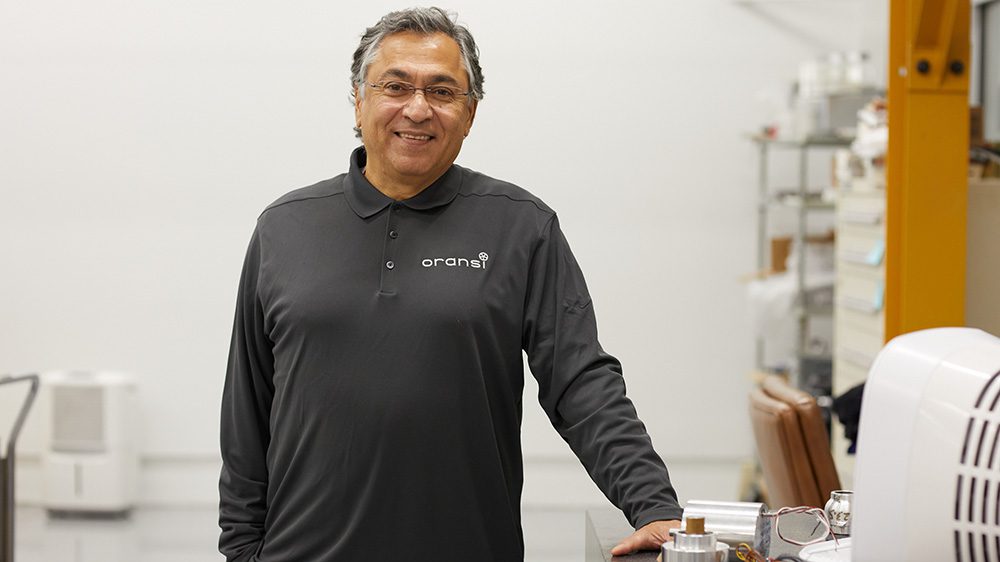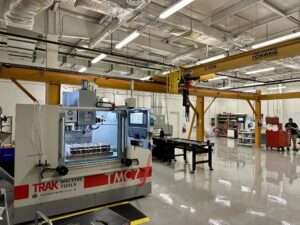Khandan-Barani ’84:
VMI is Home

Mohammad “Moe” Khandan-Barani ’84, chief technology officer of Oransi, an air purifier manufacturer.—Photos by Don Petersen, courtesy of Oransi.

Mohammad “Moe” Khandan-Barani ’84, chief technology officer of Oransi, an air purifier manufacturer.—Photos by Don Petersen, courtesy of Oransi.
Irony is an often-misused word. Some consider it a synonym for satire. Usually, though, it is an event or situation that contradicts expectations so dramatically that it becomes amusing. Long-time entrepreneur Mohammad “Moe” Khandan-Barani ’84 sees the irony in the fact his career has focused on something that challenged him as a cadet.
Khandan-Barani matriculated in 1980, 2 years after coming to the United States from Iran and enrolling at the Massanutten Military Academy. He then dreamed of flying fighters for the Imperial Iranian Air Force. During his time at Massanutten, however, a revolution in Iran replaced the shah with an Islamic republic. So, Khandan-Barani shifted to becoming an electrical engineer—and attending VMI.
“I was completely clueless, and although I had attended a military high school, I didn’t know what to expect.” He soon learned about the Rat Line’s demands, although he says the experience was tempered somewhat by a language barrier. “My English wasn’t too good then, so I didn’t understand a lot of what the cadre and the other upperclassmen were yelling at me.” He quickly learned not to mention he had attended a military high school. “I noticed my BRs who admitted they had often received more attention. So, I didn’t let on until about 2 weeks before the Rat Line ended.”
A required course in the electrical engineering curriculum—taught by the formidable Col. Lee Nichols ’44, who Khandan-Barani remembers “looking like John Wayne”—covered electrical machinery. His experience with the course was not easy. “I flunked the first time I took it, and in my second attempt, I got a ‘C.’”
A year after graduation and newly married, Khandan-Barani was searching for a job and contacted Nichols, asking for recommendations. “He told me to contact a company in North Carolina, which, I discovered, made electrical machinery.” And it is in developing and manufacturing electrical machinery that Khandan-Barani has made his career. In fact, he has been awarded or applied for 25 patents in what he describes as “motion controls, motors, and drives,” with the first coming in the mid-1990s and the most recent in March 2024.
In 1989, Khandan-Barani moved to Radford, Virginia—which, as he puts it, “has been the ‘Silicon Valley’ of electric motors since the 1950s”—to work for the manufacturer Kellmorgen. After 7 years, he struck out on his own, creating Aspen Motion Technology in his garage. It would merge with another company to become Moog, which eventually employed 300 people and enjoyed $50 million in annual sales.
He retired in 2018, but he failed at it. “I still had some exciting ideas about improving electric motors.” So, he launched Aviemore Technologies, again from his garage. Needing capital to pursue his plans, he paired with an investor and created Oransi, for which he is now chief technology officer.

Oransi’s headquarters in Radford, Virginia.
Operating from a factory in Radford since 2021, “Oransi currently manufactures air purifiers utilizing our proprietary patent pending motor technology,” explains Khandan-Barani. Sales have been brisk. Since March 2024, for example, it has sold more than 2,000 units, and Khandan-Barani sees substantial room for growth. “Our goal is 10,000 units a month and to increase the number of employees from our current 28 to 100 by mid- to late 2026.” He is confident Oransi can do this because “we have learned so much in 3 years. Now, we are experts, and it shows in our products’ quality.”
Encouraged by this success, Oransi plans to enter two other markets. The first is liquid cooling pumps for data centers. More than one-third of the world’s known “hyperscale” data centers are in Virginia—most in Northern Virginia—and companies are planning to create more. According to Khandan-Barani, these facilities require two things: Effective thermal management and massive amounts of electricity. And therein is his company’s opportunity. “Only liquid cooling can provide proper thermal management, and the industry is concerned the demand for power might outstrip the supply. Our solution: Super-efficient liquid cooling pumps that cut power demand by 20%.”
The second market is drones. “The global drone market is growing rapidly as people realize new commercial, industrial, and military applications for them. We see an opportunity to enter this $30-50 billion market in the form of developing propulsion systems that are very light, very powerful, very efficient, and all made in Radford.”
Are these ambitions too big for a company based in the New River Valley? “If you can dream it, you can do it,” Khandan-Barani asserts. “In modern manufacturing, the design stage is where you encounter major upfront costs. So, you must make it as efficient as possible by applying various technologies. Then, you must create an exceptionally lean manufacturing process that eliminates as much waste as possible. You also should work to make everything as simple as possible because simplicity is the ultimate luxury.” Asked to sum up this approach, he laughed, “In a word: Innovate—and we already do it.”
Innovation often comes to mind when Khandan-Barani thinks about VMI—and he thinks about it a lot. “Like most alumni, I think about it all the time and recall lots of great memories from my cadetship,” he said. “I am grateful to VMI because it set me on my professional path. I am more fortunate than most because I live relatively close and can visit frequently.”
So why does he associate innovation with the Institute? “VMI’s purpose is to prepare cadets to be effective leaders of strong character who will be successful in the next stage of their lives. That is what makes VMI valuable to the state and the country. Just like a business must constantly evaluate its processes and adjust based on those evaluations to remain competitive, VMI must examine every aspect of the cadet experience to ensure the education it provides cadets will prepare them to excel for the world they’ll enter after graduation. Then, adhering to its many strong traditions and never wavering from its principles, it must innovate. I know when many hear or see that word, they think of something that upends everything and disrupts everyone. But it usually doesn’t, and besides, it’s necessary.”
He is pleased by several changes the Institute has made recently, such as the establishment of a strong cybersecurity program. “The threats in cyberspace concern every business, government agency, and nonprofit, and so I am glad VMI seized the opportunity to become a leader in this field.” Asked how he sees VMI’s future, he replied, “I am very encouraged by the current leadership. Major General Wins [’85] recognizes the need to change, to innovate, and has issued an impressive strategic plan, ‘Forging 21st Century Leaders,’ that lays out how VMI will remain strong and relevant while remaining loyal to its principles.”
Khandan-Barani applied his talents and gave much of that most precious commodity—time—as a member of the VMI Keydet Club Board of Governors from 2010–16. Khandan-Barani supports VMI financially, too, mainly through the Keydet Club Scholarship Fund. Providing cadets with scholarship support is his way of paying a debt. “When I was a cadet, it was hard to get money from Iran. It once looked like I might have to leave. My Brother Rat Bill Piper [’84] heard of my situation and contacted some people in the administration. Soon, I was working as a cadet waiter, and that helped me pay for my room and board. Ever since then, I have felt obligated to do something to help cadets financially.”
There’s more to it than that, however. “VMI has a big place in my heart because, to me, it is home. I’ve never been back to Iran; therefore, when people ask where I am from, I say, with all honesty, VMI.”

The communications officer supports the strategy for all communications, including web content, public relations messages and collateral pieces in order to articulate and promote the mission of the VMI Alumni Agencies and promote philanthropy among varied constituencies.